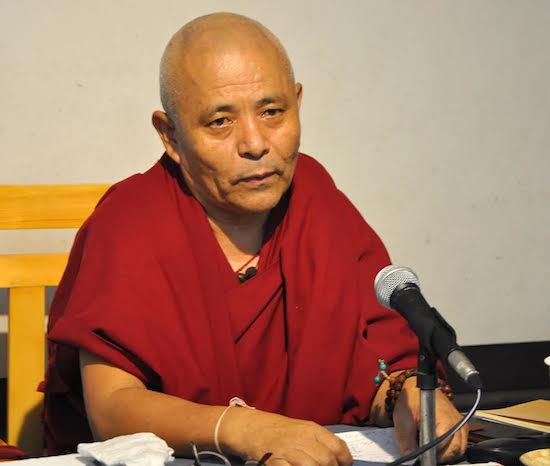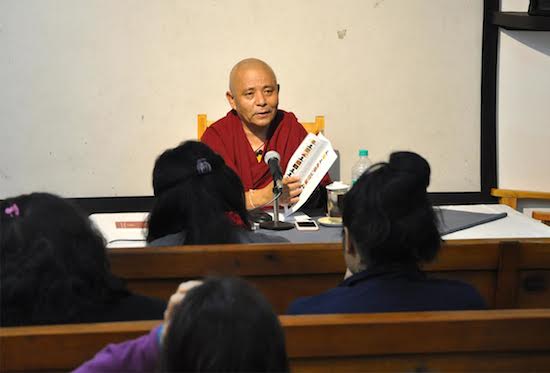Deputy Speaker Discusses ‘Tibet and Rest of the World’ at Tibet Musuem

Deputy Speaker of Tibetan Parliament-in-Exile Acharya Yeshi Phuntsok speaking on ‘Tibet and Rest of the World’ at Tibet Museum, 24 August 2016.
DHARAMSHALA: The Deputy Speaker of Tibetan Parliament-in-Exile spoke on ‘Tibet and the rest of the world’ at a bimonthly Tibet awareness talk organised by the Tibet Museum today, 24 August 2016.
Acharya Yeshi Phuntsok began his presentation by elucidating on Tibet’s independent status before 1959, based on the four international criteria for statehood: territory; population; independent government; ability to conduct international relations.
“Tibet has an independent history dating back over 2000 years. From 127 BC and till 1959, under the unified leaderships of Tibetan dynasties, Sakya lineage and the supreme leadership of His Holiness the Dalai Lama, Tibet has always been an independent country sharing a peaceful border with Nepal, Bhutan, China and India.”
He further elaborated the unique cultural aspects of Tibet that includes: Tibetan architecture, language, medicine, logic, religious culture, poetry, cultural performing art and more.
Speaking about the present situation inside Tibet, Deputy speaker explained that Tibet, under the present rule of Chinese government, has become a prison for Tibetans inside Tibet. “In the name of development, the Chinese government is destroying Tibetan culture and their way of life. Tibetan voices are suppressed with violence and imprisonment. The truth is, in Tibet, Tibetans are subjected to torture and repression both inside the Chinese prison and outside,” he said, underlining the critical situation inside Tibet.
He also touched upon ongoing environmental destruction in Tibet, including the illegal mining and extraction by government-owned businesses, dumping of nuclear waste and damming rivers on the Tibetan plateau that would seriously affect the lives of billions of people living in downstream Asian countries, including India.
Concluding his remarks, Acharya Yeshi Phuntsok reiterated His Holiness the Dalai Lama’s three main commitments and appealed the audience to voice against the human rights violation, religious persecution and the widespread environmental destruction in Tibet.

Deputy Speaker Acharya Yeshi Phuntsok speaking on the current situation inside Tibet at the bimonthly Tibet awareness talk organised by the Tibet Museum today, 24 August 2016.
